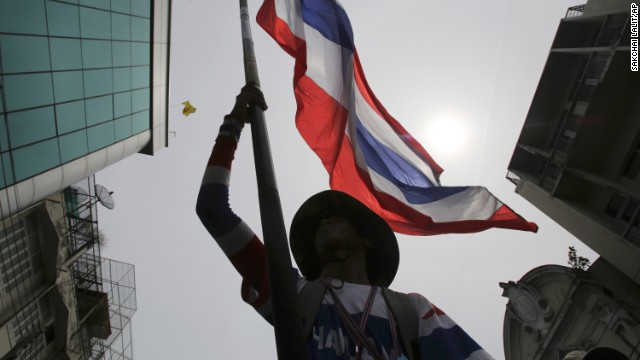Recent Articles
Home » Posts filed under Conflict
Showing posts with label Conflict. Show all posts
Showing posts with label Conflict. Show all posts
Tuesday, May 20, 2014
Tuesday, May 20, 2014
- 0 Comments
By Matthew Chance, Faith Karimi and Lena Kashkarova, CNN
May 19, 2014 -- Updated 1902 GMT (0302 HKT)
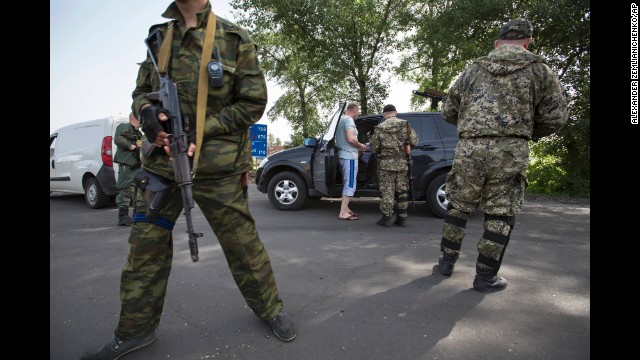 Pro-Russia armed militants guard a checkpoint in Slovyansk, Ukraine, on Monday, May 19, blocking a major highway to Kharkiv. Tensions remain high across the country's east, where pro-Russia separatists staged a referendum on independence on May 11 and presidential elections are set for May 25.
Pro-Russia armed militants guard a checkpoint in Slovyansk, Ukraine, on Monday, May 19, blocking a major highway to Kharkiv. Tensions remain high across the country's east, where pro-Russia separatists staged a referendum on independence on May 11 and presidential elections are set for May 25.
HIDE CAPTION
Crisis in Ukraine
STORY HIGHLIGHTS
- NEW: Obama administration skeptical about Putin's order
- NATO says withdrawal would be "first step to de-escalating the situation"
- Russia has said troops were conducting a routine exercise that has ended
- The presence of 40,000 Russian troops on the border has spurred fears of an invasion
(CNN) -- NATO urged Russia to keep its word this time and withdraw troops along Ukraine's eastern border, saying it has seen no signs of soldiers returning to their bases.
President Vladimir Putin ordered tens of thousands of troops near the Ukraine border to return to their bases, his spokesman Dmitry Peskov said Monday. The withdrawal has started, he said, and could take some time to finish.
But despite Moscow's assertion, there were no signs of the troops' withdrawal, NATO Secretary General Anders Fogh Rasmussen said hours later.
The Obama administration was skeptical about Putin's order, while Kiev said it's monitoring the area to ensure troops are returning to their permanent bases.
"As you know, we have heard that promise before and have yet to see any indication that it's been fulfilled," said Jay Carney, the White House spokesman.
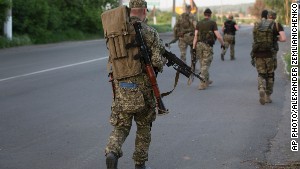 Putin orders troops back from borders
Putin orders troops back from borders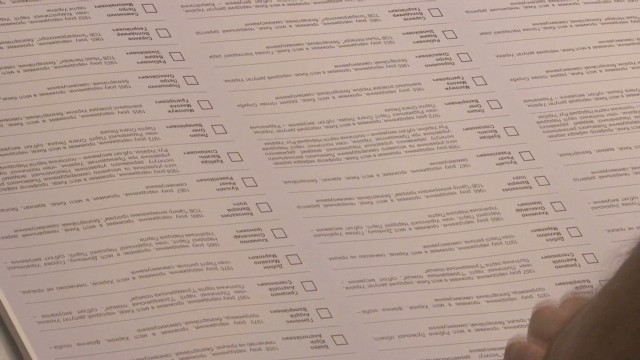 Ukraine ballots can they get to voters?
Ukraine ballots can they get to voters?
Rasmussen reiterated the need for the withdrawal and said he would "be the first" to welcome it.
"I think it's the third Putin statement on withdrawal of Russian troops ... but so far we haven't seen any withdrawal at all," he said. "Withdrawal of Russian troops will be the first step to de-escalating the situation."
Ukraine's presidential election scheduled for Sunday is crucial, Rasmussen said, and Russia and Ukrainian separatists should practice restraint to ensure it goes on as planned.
"We urge the armed pro-Russian separatist groups to stop their illegal activities. ... Russia should stop their support for these armed groups," he said.
"Russia should demonstrate a clear will to let the presidential election to go forward. The presidential election constitutes the best chance to find a sustainable solution to the crisis in Ukraine."
Russia's 'significant forces'
Putin's decision to amass 40,000 troops along Ukraine's eastern border triggered fears of an invasion ahead of the election.
Moscow defended the troop buildup, saying it was a routine exercise that has since ended.
Two weeks ago, Putin said Russian troops had pulled away from Ukraine's border and were merely conducting "regular exercises at the test grounds." At that time, NATO and Western officials said they saw no sign of widespread troop withdrawals.
But a senior U.S. administration official disputed Russia's assertion that they were routine exercises
"The fact is that Russia has been maintaining significant forces in forward deployment areas along Ukraine's border," the official said. "They have not been conducting routine training activities. They've been up on the border in a menacing posture, and we've been concerned about this military buildup and have been consistently calling on Russia to remove its troops back to their home bases and end this threatening behavior."
The official said the White House is monitoring the issue for evidence of withdrawal.
"As you'll recall, they've made similar claims before. They made them at the end of March and didn't follow through, so we'll be tracking this closely over the course of today and the coming days, and we'll want to see clear, firm evidence of this move before we make any judgment," the official said Monday.
The United States, which along with other Western countries has sanctioned Russia for its disputed takeover of Crimea, has threatened additional punishment for Russia if it fails to pull its troops back from the border.
Tensions in the east
Russian officials have said they reserve the right to protect the interests of Russian citizens and Russian-language speakers in Ukraine's east, which traditionally leans toward Moscow.
Tensions in that region remain high, with ongoing reports of violence and growing human rights abuses. Anti-terrorism operations that started in April in the Donetsk and Luhansk regions have killed 24 Ukrainian servicemen so far, said Valentyn Nalyvaichenko, head of the Ukrainian Security Service. He did not provide any more details.
In one of the latest incidents, Russian separatists clashed with Ukrainian border guards Saturday after a separatist leader was detained at a checkpoint.
Valeriy Bolotov, the self-declared governor of a "people's republic" in Luhansk, was detained by security forces in Dovzhanskiy. Attackers freed him after a firefight, but he was wounded and went to Russia for medical treatment, separatist spokesman Vasiliy Nikitin said.
Over the weekend, the Russian Foreign Ministry accused Ukrainian troops of attacking Ukrainian citizens and questioned whether Sunday's scheduled elections could be held amid the chaos.
"Such punitive action against its own citizens shows the hypocrisy of the Kiev authorities," a ministry statement said, referring to an international pact agreed to last month that called for an end to violence
Source:CNN News International
By Kocha Olarn and Catherine E. Shoichet, CNN
May 20, 2014 -- Updated 0149 GMT (0949 HKT)
STORY HIGHLIGHTS
- NEW: Thailand's military says TV and radio stations must suspend programing "when it is needed"
- Government aide calls the situation "half a coup d'etat," says military's action was unilateral
- Thailand's Army has declared martial law but stresses the move is not a coup
- Professor: The situation is "very volatile"
Bangkok (CNN) -- The Thai army declared martial law throughout the country Tuesday in a surprise move that an aide to the country's embattled Prime Minister said the government didn't know about beforehand.
"They took this action unilaterally. The government is having a special meeting regarding this. We have to watch and see if the army chief honors his declaration of impartiality," the aide said, describing the situation as "half a coup d'etat."
Lt. Gen. Nipat Thonglek told CNN the move was not a coup.
"The Army aims to maintain peace, order and public safety for all groups and all parties," a ticker running on the army's television channel said. "People are urged not to panic, and can carry on their business as usual. Declaring martial law is not a coup d'etat."
Martial law went into effect at 3 a.m. on Tuesday, the ticker said.
All Thai TV stations are being guarded by the military, Thai public television announced, showing pictures of soldiers and armored vehicles taking positions outside broadcast facilities in the country's capital.
In a statement read on Thai television, the military declared that all of the country's radio and television stations must suspend their normal programs "when it is needed."
The dramatic announcements come days after the head of the army issued a stern warning after political violence had surged in the country's capital.
Political tensions have been running high in Thailand. Supporters and opponents of the country's government have staged mass protests in recent days, and caretaker Prime Minister Yingluck Shinawatra was removed from office, along with nine cabinet ministers, by a top court earlier this month.
Thitinan Pongsudhirak, a political science professor, described the situation as "very volatile."
"This is a precarious time now for the army," he said. "They have to be even-handed."
If the military appears to be favoring one side, he said, violence could escalate rather than cool down.
"If it's seen as favoring one side or the other side, then we could see more violence and turmoil against the military," he said.
Nipat said the precise restrictions of martial law were being worked out.
The government's "red shirt" support base, many of whom hail from the country's rural north and northeast, view Yingluck's ouster as a "judicial coup" and have been protesting what they consider an unfair bias by many of the country's institutions against their side.
Anti-government protesters are seeking a new government -- but not through elections, which the opposition Democrat Party has boycotted, arguing the alleged corruption of their political rivals makes widespread reform necessary before any meaningful vote can be held.
Source:CNN News International
Wednesday, May 14, 2014
Wednesday, May 14, 2014
- 0 Comments
By Tolu Ogunlesi, Special to CNN
May 13, 2014 -- Updated 1556 GMT (2356 HKT)
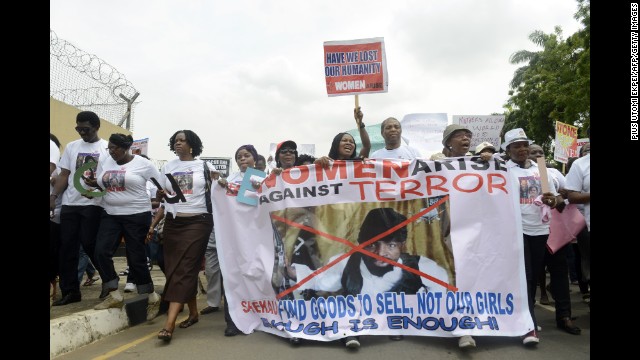 People march in Lagos, Nigeria, on Monday, May 12, to demand the release of schoolgirls kidnapped from Chibok last month. The abduction of nearly 300 female students who remain captives of the Islamist militant group Boko Haram has attracted mounting national and international outrage.
People march in Lagos, Nigeria, on Monday, May 12, to demand the release of schoolgirls kidnapped from Chibok last month. The abduction of nearly 300 female students who remain captives of the Islamist militant group Boko Haram has attracted mounting national and international outrage.
HIDE CAPTION
Nigerians protest over kidnapped schoolgirls
STORY HIGHLIGHTS
- More than 200 schoolgirls kidnapped in Nigeria on April 14 are still missing
- The mass abduction has been claimed by militant Islamist group Boko Haram
- The United States is among the countries that have offered to help Nigeria find the girls
- Tolu Ogunlesi says Nigerians realize foreign help is needed but query U.S. motives
Editor's note: Tolu Ogunlesi is a Nigerian journalist who was awarded the Arts and Culture prize in the 2009 CNN MultiChoice African Journalist Awards. Follow @toluogunlesi on Twitter. The opinions expressed in this commentary are solely those of the author.
(CNN) -- The Nigerian government is up against a wall. The inability to locate the more than 200 school girls abducted a month ago has embarrassed the government and forced President Goodluck Jonathan to appeal for foreign help as Nigeria's five-year struggle with terrorist group Boko Haram escalates.
It does seem that Nigerians are caught in the difficult position of having to welcome the help and be deeply wary of it. On the one hand we know, from the evident helplessness of our government, that we're at the point where we cannot make any progress without the skills and knowledge and technology that Western countries will bring to this battle.
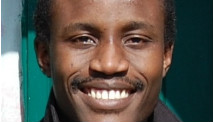
Tolu Ogunlesi
On the other hand, there are questions (running the gamut of conspiracy theory to reasonable concern) about America's motivations, and its track record.
"I have my reservations," says Debo Bashorun, a retired Nigerian army major who served as press secretary to military president Ibrahim Babangida in the late 1980s, and is now a vocal critic of the Nigerian military. "[Now] this is a good time [for the Americans] to do what they've always wanted to do," Bashorun says.
He's referring to the U.S. Africa Command (AFRICOM), run by the U.S. Department of Defense, and established by President George W. Bush in 2007. From early on African leaders opposed attempts to site AFRICOM's headquarters in Africa.
On his first official trip to Washington as president in December 2007, on the invitation of President Bush, Nigeria's President Yar'Adua made comments that were interpreted back home to mean that Nigeria was acceding to America's AFRICOM-in-Africa push.
It doesn't help that many Nigerians believe, on the strength of pessimistic American assessments of Nigeria's fate, that its inclinations towards their country are sinister.
Tolu Ogunlesi
Tolu Ogunlesi
Outrage in Nigeria compelled the president to declare that he "did not agree that AFRICOM should be based in Africa."
"What we discussed with [President] Bush is that if they have something to do for Africa that has to do with peace and security, they should contribute. I told him that we African countries have our own plan to establish a joint military command in every sub-region ..." he said.
Segun Adeniyi, Yar'Adua's spokesperson, says those comments displeased America. "[By] openly repudiating the idea of AFRICOM, Nigeria's relationship with the U.S. on Yar'Adua's watch had started on a very bad note. It was a relationship that would remain at a less-than-inspiring note throughout his tenure," Adeniyi writes in his book, "Power, Politics and Death," an account of the Yar'Adua administration.
Nigerians are right to be wary of America's military intentions, with the cautionary tales of countries like Iraq and Pakistan.
"This is a transactional relationship; there's nothing strategic about it," said Ehsan ul-Haq, retired Pakistani general and one-time head of the country's Intelligence Agency ISI, of U.S.-Pakistani military relations, at a reporting seminar for journalists which I attended in London in 2011.
He added that the cumulative value of U.S. military assistance to Pakistan ($20 billion at that time, he said) paled into insignificance compared to Pakistan's losses from the war on terror --- which he put at not less than $68 billion.
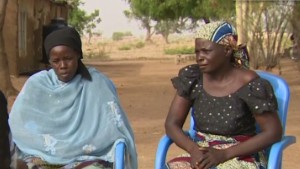 Mother of missing girl: 'Our hearts hurt'
Mother of missing girl: 'Our hearts hurt'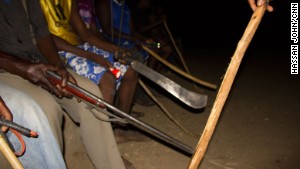 Nigerians take security into own hands
Nigerians take security into own hands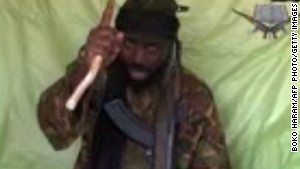 Could girls be freed with prisoner swap?
Could girls be freed with prisoner swap? Nigerian girl escapes from Boko Haram
Nigerian girl escapes from Boko Haram
Bashorun echoes those views. "America will not do it out of honest intentions," he told me. "It's a matter of giving you 10 naira and in the long run they will collect 50 naira," he says.
But he is pragmatic enough to realize that at this point Nigeria has got little choice in the matter. "If we had done what we were supposed to have done, things wouldn't have turned out like this," he says.
Then again there's the strong possibility that suggestions of the United States turning Nigeria into another Iraq or Pakistan are unfounded.
Anonymous Nigerian defense blogger, Beegeagle, points out that Nigeria has long enjoyed significant levels of cooperation with the United States, in terms of receiving donations of hardware and training.
"The difference in this latest American effort is that the U.S are going to collaborate with Nigeria in the field --- an undisguised first," he wrote in an email message to me. But even that field work, he says, will not involve "putting [American] soldiers on the ground to fight alongside Nigerian soldiers."
That will no doubt be comforting to many observers. But there's obviously still a lot that needs to be clarified regarding the extent and mode of foreign help Nigeria will be getting. For now the solidarity mounts; at the last countAmerica, Britain, China, Canada, France and Israel had already thrown in offers of assistance.
Nigerians will of course continue to be wary, and quick to bristle at any threats, real or imagined, to Nigeria's sovereignty. It doesn't help that many Nigerians believe, on the strength of pessimisticAmerican assessments of Nigeria's fate, that its inclinations towards their country are sinister.
And Nigerians have been there before. Shortly after Independence in October 1960, Nigeria's Parliament formally approved the terms of a controversial "Anglo-Nigerian Defence Pact," which the Nigerian public had come to believe would give the departing colonial power the right to set up military bases in Nigeria.
The protests that followed, led by student and labor groups, resulted in the speedy repeal of the agreement by the Federal Government barely a year-and-half later.
Source:CNN News International
Subscribe to:
Posts (Atom)

